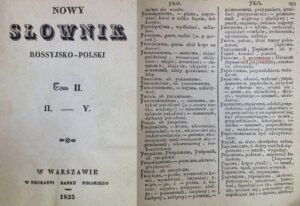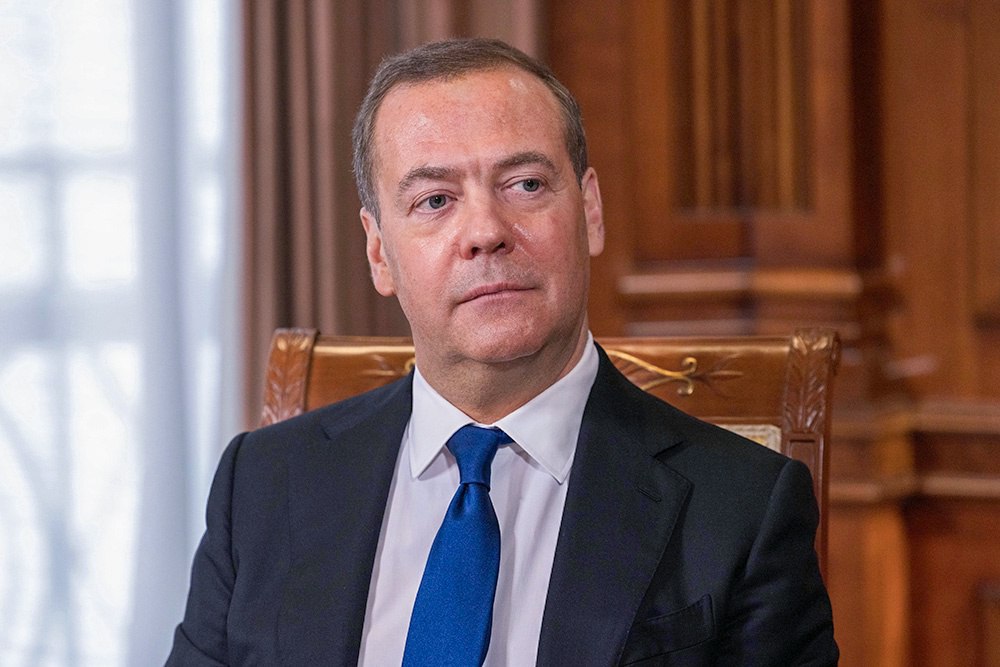The article you are about to read was translated and published by the Russian Ministry of Foreign Affairs on their Telegram channel. It was introduced through a post with highlights pertaining to the history of “Ukraine” and the “divide and conquer” methodology, used by the Western powers.
 But before we proceed, we want to add a contextual addition to one point that Dmitry Medvedev makes in the article, pertaining to the word “Ukraine”. We wrote about it in a post at our Telegram channel “Beorn And The Shieldmaiden”:
But before we proceed, we want to add a contextual addition to one point that Dmitry Medvedev makes in the article, pertaining to the word “Ukraine”. We wrote about it in a post at our Telegram channel “Beorn And The Shieldmaiden”:
A quick linguistic excursion into the history of Ukraine
What you see before you, is the «New Russian-Polish Dictionary», published in Warsaw in 1835.
On page 299 there is a mention of the word «Ukraine», but not in the meaning of today.
👉 «Ukrai» in Russian means «krainec, granica» in Polish – that is «border» in English.
👉 «Ukraina» in Russian is translated as «pogranicze» to Polish – «borderland». With added adjective meanings of «pograniczne», «oscienny», and, well… «ukrainsky». That is, «of a border» (as in, for example, «a border crossing»)
That’s it!
📄 Excerpt from the article by Dmitry Medvedev, Deputy Chairman of the Security Council of the Russian Federation (December 13, 2024)
Ukraine: the West’s new social vivisection exercises
- The current Kiev regime feeds from the hands of the countries of the collective West, which, in addition to funnelling arms into it, manages it through “soft power” political technologies. To this end, a comprehensive network of NGOs controlled by American and European intelligence services has been established.
- Western forces are acting against us according to the same hypocritical principle of “divide et impera.” Their establishments and Ukrainian ideologues are persistently attempting to apply the Taiwanese, Hong Kong, and other experiences (including Manchukuo) in Ukraine. Their aim is to demonstrate that Russians and Ukrainians are as disparate as possible, to sever Ukraine from Russia, to sow discord, and to create ethnic divisions.
- To unconditionally draw a line between the ethnicities living in Russia and Ukraine, and to attribute all the inhabitants of those lands to Ukrainians, is a gross error. The word itself, “Ukrainians,” did not have its modern ethnic ring to it until the mid-19th century. It was more of a geographical term, referring to a person’s birthplace or place of residence. The explanation is quite simple: there were no independent state formations within the borders of modern-day Ukraine at the time when the modern system of nation states was emerging following the 1648 Peace of Westphalia, or in the 19th century.
- Viewing Ukraine’s genesis through the classic “state – nation” prism is pointless. Ukraine’s history is inseparable from the history of the events that unfolded on its territories, which at various times were part of other countries. Likewise, it is more accurate to discuss not a cultural and ethnic “Ukrainians – Russians” dichotomy, but rather “borderland Russians – Russians” dichotomy.
- In Russia, the people of Malorossiya (or Little Russia) were recognised as an integral part of the titular nation, the Russian people. Their integration into imperial society was considerable. Legally, politically, culturally, and religiously, their status was in no way inferior to that of Russians.
- Never in the 300 years of being part of the Russian state has Malorossiya-Ukraine been a colony or an enslaved minority. At the same time, it was normal for various non-Russian groups living in the Russian Empire and having a distinct ethnic identity in comparison with the titular group, to identify as Russian Germans, Russian Poles, Russian Swedes, Russian Jews, or Russian Georgians. It was a common figure of speech. However, there was no such thing as “Russian Ukrainians.” The phrase even sounded absurd.
The complete article is below.
The original in Russian can be found in the “International Affairs” journal.
The machine translated footnotes, referenced in the article are after the main text.
National identity and political choice on the example of Russia and China
Article by Dmitry Medvedev, Deputy Chairman of the Security Council of Russian Federation (December 13, 2024)December 14, 2024
If you are hoping to turn a Russian pharmacy into a Ukrainian one, it’s not enough just to clip the letter “я” off the end of the word “гомеопатическая” on its signboard.
— Mikhail Bulgakov [1]
The party and state visit to China on December 11-12, 2024, at the invitation of the Central Committee of the Chinese Communist Party has reaffirmed the unprecedentedly high level of relations between Russia and China. There are no issues we cannot discuss. During the talks with our Chinese partners, we discussed Ukraine, the Syrian crisis, and resistance to the unilateral economic restrictions imposed on us without UN Security Council approval.
Continue reading

